
 Department of Conservation and Recreation
Department of Conservation and Recreation
Conserve. Protect. Enjoy.
 Department of Conservation and Recreation
Department of Conservation and Recreation
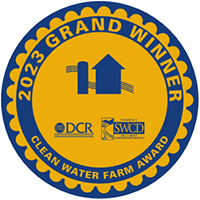
The annual Virginia Clean Water Farm Awards recognize farmers who implement conservation practices and do their part to preserve water quality. The program is sponsored by the Virginia Department of Conservation and Recreation in partnership with Virginia’s 47 Soil and Water Conservation Districts. Grand Basin winners represent the most exceptional of these awardees. The winners’ conservation practices and dedication to protecting natural resources make them role models for producers across the state.
Many thanks to district staff members who made this another outstanding year for the Clean Water Farm Awards.
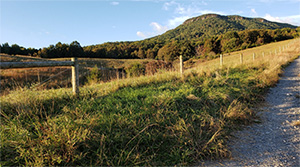
Prompted by a continuous uphill battle to find a reliable water source for his herd, Greg Meade began consulting with the district to develop a conservation plan. The livestock were wearing travel paths on the steep hills and stream banks of Mr. Meade’s 311-acre farm in Tazewell County, degrading the water quality and soil health, and producing overgrazed fields near the streams. Since cattle can be difficult to move or keep on the property due to the limited amount of fencing, rotational grazing has been the solution. Using more than 15,000 feet of fence, he created 11 paddocks with a travel lane on 150 acres. This strategy, coupled with stream bank stabilization along the Little River, protects environmentally sensitive areas and wildlife habitat, enhances water quality and aquatic life, as well as improves herd and soil health. A new watering system supplies multiple water troughs that are strategically placed to eliminate excessive travel and facilitate weight gain for the livestock. A riparian buffer and a nutrient management plan have further addressed the water quality issues. Mr. Mead’s conservation practices, which have created more productive and sustainable farm operations, are gaining him recognition in the local farming community.
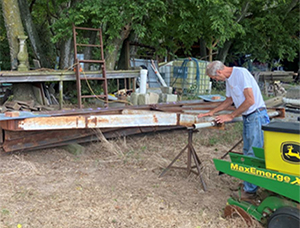
Shelton Alley’s background in construction and current role as soil and wildlife conservationist play a vital part in his farming journey. His home on the Eastern Shore is surrounded by approximately 100 acres of farmland, 100 acres of marshland and 100 acres of woodlands. His first undertaking was controlling the invasive phragmites on his marshland that prevented the diamondback terrapins from returning after laying eggs on the mainland. Then, Mr. Alley’s efforts focused on implementing strategies to improve the main irrigation pond’s habitat for eels, quail and other avian species. His no-till equipment reduces soil erosion and nutrients in the sea and freshwater waterways, and his implemented crop rotation of corn, soybean, wheat, and cover crop, is working to deplete the excessive weed seed bank. His lightweight precision sprayer limits soil compaction and disturbance, and his recent project of a handmade roller-crimper will increase the soil’s available nitrogen and decrease the use of chemicals. Mr. Alley’s dedication to the environment is evident in his innovative farming and conservation practices.
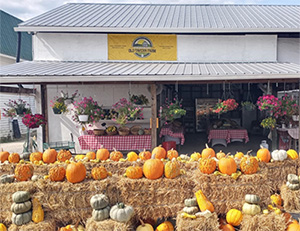
From effective cover cropping and rainwater harvesting systems to elementary school programs, John Bryant and his team take a truly exceptional, hands-on approach to soil and water conservation. Due to his mix of crop varieties, each serving a different purpose, there is never bare ground at Mr. Bryant’s farm in New Kent County. Every crop choice ties directly into his nutrient management plans, which prevent excess nutrient runoff by avoiding broadcast fertilization. Additionally, the farm’s rotational paddock operation of the woodland-pastured hogs counteracts soil disturbance and waste buildup in one single area. The installation of a six-tank system – which he hopes to expand in the future – holds over 3,500 gallons of stormwater that would normally flood the market area, while also providing stored water to irrigate his crops when needed. He has also hosted students and teachers, as well as adults in the area, providing an up-close experience of conservation-minded farming practices. These practices, along with his pursuit of USDA organic certification for his wide selection of vegetables, fruits, and pasture raised eggs and hogs offered at the farmstand, local grocery stores and restaurants, demonstrate his commitment to a more sustainable future of farming.
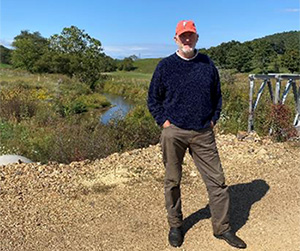
Recognized as a Virginia Century Farm, historic Summerfield Farm is comprised of more than 1,850 acres of pasture, cropland and deciduous forest in Grayson County. Around 800 of those acres are protected by a conservation easement through the Virginia Outdoors Foundation. As co-owner and operator, Col. John Fant implemented a rotation program to rest his pastures and extend the grazing season. This cow/calf and sheep/lamb operation, which raises grass-fed, grass-finished calves and lambs, has introduced heritage breeds of cattle and sheep as part of the genetics improvement program. In 2021, Summerfield Pastoral Farms, LLC was formed as part of the farm's sheep/lamb operation expansion. By adding 134 acres of additional grazing, while establishing streambank protection and riparian borders and reducing surface water contamination, 100% of the farm's streams and wetlands are excluded from livestock. Further implementation of paddocks, water systems and rotational grazing areas have resulted in better soil health, erosion prevention and overall livestock health. Currently, Col. Fant is awaiting approval of BMP cost-share and technical assistance to address agricultural waste storage needs at their lambing barn.

Conservation practices are part of the everyday routine at Long Stone Farm, a 250-acre grass-based diversified livestock operation in Loudoun County. Farming without the use of pesticides, insecticides or herbicides, Casey and Justin Wisch and their four children are committed to producing high-quality meat and eggs in managed grazing systems that are beneficial to livestock and surrounding ecosystems. With a focus on improving soil, animals, plants and human health, they utilize farming practices such as multi-species forages, cover cropping and low/no-tillage planting. To protect the water quality of the stream that flows through the farm, 8 acres of riparian buffer were created. As firm believers in farmland conservation, they placed conservation easements on their properties that permanently protect the land. After attending Chesapeake Bay Foundation’s “Farmers to the Bay” program, Mr. and Mrs. Wisch strive to help the production of oysters by teaming up with oyster producers on Tangier Island to provide fresh bay oysters in their farm stores. They also regularly participate in the Loudoun County Farm Tour and host training opportunities with various organizations. Additionally, they are working to improve genetics of their Registered Red Angus using the Red Angus Association’s GridMaster Index. Future generations will benefit from the environmental improvements made by the Wisch family.

John Paul and Molly Visosky manage Locust Dale Cattle Company, 900 acres of pastureland situated on a farm of 4,200 acres in Culpeper County. Conservation efforts with the district began in 2015 when Mr. Visosky had a desire to change the farm’s management style, utilizing grass and other forages to create a pasture-raised cow/calf operation. With the goals of implementing fencing to establish a rotational grazing system and installing a series of water systems to supply cattle with reliable water, six ambitious phases were set in motion. The phases, covering three different sections of the farm, included the installation of 7 miles of stream exclusion fencing, 2.3 miles of interior cross fencing, 4.7 miles of pipeline and 19 water troughs. Mr. Visosky’s enormous conservation efforts show his commitment to improving soil and water quality. He is currently working on five smaller projects to install additional interior cross fencing and two water troughs in some of the largest fields for added flexibility and better utilization.

Tim Alderson and his family strive to implement conservation practices on their 210-acre farm in Pittsylvania County by improving surrounding water quality and spreading this information to other producers in the area. Mr. Alderson’s first conservation cost-share project with the district in 2010 completed a total of four stream exclusion and grazing land management projects. To make the best use of grazing land for his 75 cow/calf pairs and three bulls, he uses rotational grazing and alternative watering facilities. He also routinely takes plant and tissue samples to ensure soil health for the best quality forage to feed his cattle. Components of the livestock exclusion projects include 12,035 feet of exclusion fencing, 11,277 feet of pipeline, 28.19 acres of buffer area, 15 troughs, two wells and two pumping plants. Mr. Alderson is currently installing more exclusion fencing, pipeline and troughs, and an additional 1.42 acres of forested riparian buffer will be added once his new stream exclusion project is complete.
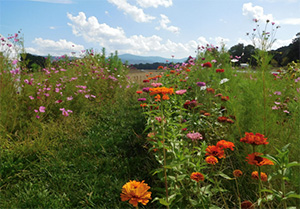
With a constant focus on maximizing production while taking care of the environment, Justin and Kristi Schmidt and their two children take pride in their family farm. Consisting of poultry, livestock and vegetable production, the farm is made up of 8.5 acres of vegetable beds, 35 acres of pasture and 30 acres of woodland. Raised beds utilizing bioplastic are used for vegetable production, with minimal tillage. Soil samples are taken each year and tissue samples of the tomato crop are collected four to five times per crop cycle to aid in fertilizer management. The 35 acres of pasture are divided into five permanent paddocks, subdivided and used for rotational grazing. Livestock have been excluded from a pond and approximately 3,600 feet of streambank in the headwaters of Elk Run, as well as the woodland. The poultry operation includes systems such as bin composting with wood chips. Additionally, Mr. Schmidt’s part-time role as a real estate agent, specializing in selling farms, provides opportunities to educate others about conservation practices, which can improve farming operations as well as protect water quality.
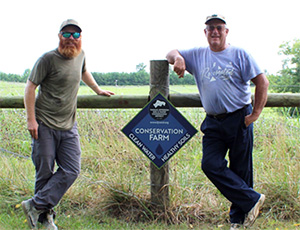
This 1926 fourth-generation family farm is now operated by Fred Massie and his son Peter Massie. Together they graze 450 acres on multiple farms in the York River Basin, steadily transitioning from an open pasture system to rotational grazing techniques. Fred formed Massie and Sons Farm in 1984 after becoming the primary farm operator. Both father and son grew up on this family farm and bring with them not only many years of experience but also new ideas on how to ensure future success for the farm. Since their work with the district began in 2018, they have installed permanent infrastructure that has protected over 33,000 feet of streambank and has excluded approximately 75 acres of riparian buffers to provide important wildlife corridors. Through permanent and temporary infrastructure, the Massies have actively transitioned the farm and herd into a rotational grazing schedule, decreasing the amount of hay feeding and improving pasture and soil conditions. Additionally, they have grown their cropping rotation to include cool-season and warm-season cover crops and no-till planting on 35 acres. The duo continue taking steps to further their education, improve their techniques and promote conservation programs to others in their community.
See the 2022 CWFA Grand Basin Award winners.

